 Posting chapters from NaNoWriMo will hopefully introduce some accountability. Honestly, though, I still don’t anticipate much success. Guess I’ll see.
Posting chapters from NaNoWriMo will hopefully introduce some accountability. Honestly, though, I still don’t anticipate much success. Guess I’ll see.
STAR-CROSSED AND HELL-BENT
CHAPTER 4
Theserra was sick to death of mushrooms. It felt like she was eating someone’s nose, but with less flavor. Granted, Theserra had never eaten a nose, nor any other part of any animal, but she had been an imaginative girl and some of that whimsy remained in the woman. She was now growing concerned that this whimsy would translate into madness if they did not come across some more nourishing food in the near future.
Shienna and Donnard, meanwhile, were eating like royalty. Shienna had felled three pigs and a deer in the Blue Wood the afternoon of their departure, and had proven to be as skilled at curing meat as she was at killing it. The heretic life of a Eubarist was certainly an easy one, and as Theserra’s own nose played host to the salty scents of roasted and moistened salt pork, she understood why apostasy was so common among her people. But if one abandoned one’s faith at the first pang of hunger, then one’s faith had never counted for much, had it? Theserra’s mother had often said that it was not the great trials that showed our true faith, but rather the constant inconveniences we must endure while others lounged on indulgence. She could see her point. Only three days into their return trip, she was ready to risk the shadows for a lick of salt.
“I still say we should have stopped by Top Hill,” she said after five minutes of silence.
Donnard groaned and lay back on the downy turf. “For what? You want to investigate this secret cat worshipping cult?”
“I said nothing of a cult. Top Hill is right next to Sunderland. Why should they not—“
“What?” Shienna spat. “You think an entire town conspired to turn Handler into a werewolf against his will?”
“There are no werewolves!” Theserra shouted, standing. Her clenched fists mashed and ruined her spongy mushrooms, for which she was duly grateful. “You are talking about spiritualist nonsense. This is about land, plain and simple. We will not find the answers back at the capital.”
Shienna did not stand, but her seemingly relaxed pose was tense and ready to strike. “Aryam will have returned by now. Who knows what he is whispering into the little prince’s ear?”
“The prince is not going to declare war because one adviser suggests it.”
Donnard sat up again. “If you want to return to Top Hill, Theserra, You have my leave. We at least are headed home. That point is resolved.”
It was an old argument already, true. Theserra relaxed her fists and let her breakfast fall in between the short blades of grass that gave the Shallow Pass its name. A sympathetic glance from Shienna calmed the remainder of her fury. It galled them both that Donnard had been put in charge of them. He had little to no knowledge of the Provinces and was about as subtle as a thunder clap, but he was the son of the First Wizard Nacella, and Nacella was firm that her son would take orders from no one (except herself, of course). Perhaps he would prove his secret worth in time, but at present all he displayed was his remarkable ability to play the two acolytes against each other and affect insouciance whenever they caught onto his petty games.
Donnard’s head was round as a ball, his great ears sticking out like the handles of an amphora. Theserra fantasized, not for the first time, of grabbing those ears and shaking Donnard’s head until some sense fell loose. She let it lie, though, and turned her eyes to the southwest.
She could do it. She could just head off on her own and investigate Top Hill herself. They were all grasping in the dark anyway. Whoever had wanted Ulvis Handler dead had also managed to get to into his home well before they had arrived in Bluefield. There was nothing in his modest, provincial house to suggest he was guilty of sedition, of apostasy, nor anything as ridiculous as magic. Indeed, there was scarcely any evidence left that he was a dyer: just a handful of reds and yellows and a few thimble-sized bottles of precious blue, which she had swept into a small satchel in quick order. Theserra mused that this might all have been a plot to seize on some purple dyes, but of course she knew better. The relatively plain garb of the Faith, who were the government of Bluefield in all but name, showed that dye was a commodity producible but not affordable in the little town. This seemed radically unjust, but dye was a pointless vanity, so Theserra let it go.
Thinking on dyes made her consider the elaborate costumes they had worn in Bluefield, now bundled in a sack at Shienna’s feet. She had been wrong about those, and she admitted as much. She had been certain even backwater provincials would recognize gaudy, outdated wedding costumes upon sight, but everyone seemed convinced that they were highborn royals, and all ways had been open to them. Donnard had jested that they might call themselves gods and rule over the town in decadent luxury, which was exactly the sort of thing Donnard would love to do, but he called it a jest and they had ignored it. Back in her black and grays, with her rough spun vest, she felt much freer and more mobile. Let Shienna play her parts, Theserra preferred action.
“I’m going,” she decided, aloud. “I am returning to Top Hill.” There was something there, she was sure of it. Something in Top Hill had changed Ulvis Handler from a simple barrel maker to whatever he had become, whatever service he had undertaken for which dyer seemed a suitable facade.
Perhaps he had tried to become an alchemist. Alchemy was more magical nonsense, but most people were superstitious enough to be terrified by it. That alone would be enough to convince the local Faith to kill him horribly, but how such delusions might get him mixed up in whatever Aryam had planned for the nation was unclear.
It was all enormously frustrating. It made Theserra yearn to do something, and following Donnard around was not sufficing.
She took one step. Then she took another. After a second thought, she picked up her satchel and her shoulder bag, then took off at a brisk pace, lest she change her mind. Neither Shienna nor Donnard could be heard to say anything.
Strictly speaking, she was doing nothing wrong. The Wizards were more of a loose sorority of concerned specialists than a military organization. And no matter how regimented they were, Donnard had just given her his leave to go. But Theserra had spent her life obeying orders, and striking out on her own, even for something as simple as this, made her lightheaded.
She turned around and started walking backwards, looking at their makeshift camp as it grew smaller. She could still see them, she could still turn back. Despite all her life of discipline, though, she had her pride, and no force on the earth or in the sky could compel her to turn around and admit she was wrong. So she turned around and kept walking away.
She was not wrong. Back in Mooncrest, they would be three Wizards among dozens, scrambling about trying to undo whatever Aryam and his Visionaries were plotting. They wanted war with Farring, everyone knew that, no doubt to seize power from the Wizards during the chaos that war always brings. It was a war they could not hope to win, however. Farring’s armory was in another class from their own, as the demonstration in Bluefield had proved. Their reprisal could mean the end of the nation, or at least the end of the capital. And Montas without Mooncrest was no nation at all, just a smattering of provincial hamlets with no uniting government, no economy, not even a culture with which to bind them together. Even Faith could not be relied upon, as the encroaching cat worshippers in Top Hill showed. No, this was a conflict for the very soul of Montas.
Not that Theserra believed in souls. Even as a young woman, long before she joined the Wizards, Theserra had idolized Uthenna, called the Shadow Wizard. Most considered her a petty contrarian: when others sought to supplement granaries, she called for austerity. When they pushed for peace, she called for war. Theserra’s three stints of military service, all in the Eastern Border Disputes, had come after one of Uthenna’s speeches. “Appeasement is a weed,” she often said, “that will choke you if you let it grow.” When the Faithful pointed out that eight of the twelfth Angels always spoke for mercy, the Shadow was quick to answer that the other four spoke of justice, and they were still around despite being outnumbered. She was a warrior poet, and there had been none like her before or after. She had died from a chill and a cough ten years back. It still seemed criminal that such a powerful noblewoman should be felled by something so common, but justice was something made by women, not the sky or the earth.
Theserra was uncomfortable advocating peace. This was another border dispute, albeit with Farring this time, and the young warrior in her cried for blood. She had often asked herself if the Shadow would still insist that they die for their dignity, or if she would consider diplomacy in the face of doom. She knew the answer, though, and so tried not to dwell on it.
These thoughts ran over and over in her head, so that when the approaching sunset stirred her, she realized she had been wandering for several hours without focus. The Blue Wood lay again to the southeast toward her left, but memory told her Top Hill was hanging far to her right. She would not arrive tonight, nor the following night, and the chill in the darkening sky left her a bit unsure of how to proceed. It was slowly donning on her that she had never before been by herself outside of civilization. She had never even built a fire: Shienna had done this throughout their journey. As the full weight of her rashness settled on her shoulders, she considered creeping into the edges of the forest sleep, perhaps up in the branches of a tree.
As she pondered, her eye was drawn to the Wood, where a tiny flicker of red and orange could be seen not far into the trees. Was someone else there? It seemed fortuitous. Strangers were always dangerous, and Theserra had only her dagger with her, but she was still a Wizard and a battle-hardened warrior, two things unlikely to be found in the Provinces. She nodded, assuring herself, and headed for the trees.
It was well and truly night when at last she reached the edge of the Blue Wood, but even this far from Mooncrest, the night was still silvery bright. The moon was almost still full. Theserra knew from personal experience that even as far as eastern Farring, the moon was still more than half its fullness, and this made her wonder: what was east of the shores of Farring, and what strange things might one see beneath the blackness of an empty moon.
Nighttime was what gave the Blue Wood its name. The moon cast the leaves into shades of dark indigo, and their dead forebears covered the ground in an inky carpet that squished loudly like a mire where she trod. It was just as well. She did not want to sneak up on whoever had made camp within the Wood, lest they become too frightened to share the fire with her. She casually weaved her way through the black-barked trunks, her left hand resting on her belt just shy of her sheathed weapon. She did not anticipate danger, but neither was she a fool.
“Who’s there?” some idiot called out. Theserra wanted to put them at ease, but she also wanted to see who she was dealing with first. She stepped out from between the trees into a small clearing.
The first thing she happily noticed was that the wet blue leaves and been swept away from the fire, which was surrounded by a tight ring of stones. Satisfied that she would not soon burn, she looked upon the two people that had stood to face her. Closest to her, his leg blocking part of the fire, was a hulking man in a brown hooded cloak and ancient leathers, bearing a scythe that looked almost dainty in his huge, calloused hands. Theserra had seen and slain larger men, but not many. His face was in shadow, but she could just make out bright blue eyes and glowed with the open dullness of cows and cowherds. He looked tense and ready to move, but also slow and nervous. As expected, this was no fighter.
His companion on the other side of the fire was much smaller, though she looked deadlier. She was an old woman, draped in a great black cloak and robes. The fire made her ancient wrinkles and scars dance upon her face like devils as her sparkling blue eyes stared at Theserra. She appeared to be unarmed, but both of her hands were hidden within the folds of her cloak. Theserra knew that trick well, but still she kept her dagger in its sheath.
“Greetings, friends,” she began.
“No friends” the lummox countered, “we are your enemies.”
“Pie up, Rubald,” the old woman said. “Who are you? You’ve a foreign look, I think.”
This was not the first time Theserra had been told such. Provincials all tended to be squat, bandy legged, plump, or stooped. Those fair to look upon were rare treasures in small towns, and often treated as such for weal or woe. The lummox, called Rubald, was not doubt a rarity, assuming he was from Bluefield.
“I am from the city,” she offered. “I spied your fire from without the Wood, and came in hopes of sharing it.”
Rubald shook his head like a wolf with a bone. “No foreigners here.”
“She’s a stranger, not a foreigner, you lackwit.” The old woman was already settling back down, grabbing a leg of some meat Theserra did not recognize. “I am doomed to spend my life climbing ladders with broken rungs, and this great goon is the latest. He is called Rubald, as you know doubt heard. Who are you?”
“I am called Teresa” Theserra offered without hesitation. “You are from Bluefield, I wager?”
“I am, born and bred. This oaf was found in a riverbed, knocked cold when he was a year or two. No one can say where he’s from, not that many have wondered. I am a Matron, and you may call me such. Heel, Rubald, heel.”
Rubald turned to look at the Matron, not seeming to understand this command. When he spied her tearing into her meat, however, he saw there was no danger. He dropped his scythe carelessly onto a pile of soggy blue leaves and sat cross-legged upon the ground.
Theserra crept closer to the fire and sat, feeling at east, though she kept her left hand near her belt. “What business keeps you so late in the Wood, Matron?”
“Mine,” she answered with a full mouth. “If we are to wile the hours with questions, we’ll start with you. Are you here to see the execution?”
Ulvis Handler was four days dead by now, of course, but Theserra did not wish to give too much away. “An execution, you say?”
Rubald had taken up some meat, what looked to be a large set of ribs, and gnawed greedily upon it. “The boy, ay,” he said. “Her boy is set to die, we think.”
The Matron waved her hand dismissively. “Some boy, a village boy, not my boy. He was trafficking with evil spirits. The Faith will try him tomorrow and kill him thereafter, I shouldn’t doubt.”
Theserra almost let her surprise show. Had Ulvis Handler truly been guilty of witchcraft, or was this only a coincidence? Who was this boy, and what did he have to do with the dyer and his witches? “Evil spirits, out here in Bluefield? That sounds unusual.”
“Not as much as it once was. We killed a set of witches not five days ago, now this boy will follow them. Evil times, I fear. You’d do well to steer clear of Bluefield. Strangers are rare there, and I fear they won’t hold much with your foreign cast.”
“Perhaps I’ll head west,” she said, noncommittally.
The Matron gave a laugh that sounded like scoffing, again and again. “A worse idea. There actually are witches out west and south. I cannot say what your business is, city stranger, but I think your best business awaits you back home. Return to your big house in your big city, it is safer there.”
“Witches? You mean in Sunderland?”
“Oh, there too, but they’ve been creeping into Top Hill, not far from here. Cat worshipers. Sunderland is full of them, and now they’re invading Montas. Between Top Hill’s cats and Bluefield’s executions, this is a bad time to be the southwest.”
Theserra had never heard anything so absurd. Cat worship had been a part of Sunderland for a thousand years, but their idolatry had kept them mired in useless superstitions, falling well behind the five other nations. Sunderlanders did not even know how to forge steel before her mother’s mother’s time, long after the foolery of cat worship had given way to some vague corruption of the Great Wheel: a worship of the twelve angels under some other name, and without the Wheel itself to unite them. Theserra knew little of it, but there was little to know. Sunderland was slowly joining the other nations in the new era, and long past due. The idea that some magical threat could be brewing there was provincial nonsense.
Of course, Theserra said none of this, only nodded. “Perhaps I shall return home, then. If you are from Bluefield, though, what do you mean to do here in the Wood at night?”
The Matron’s stare was unblinking. She had cleaned her bone of its meat, and so tossed it into the flame. “I am a tired old woman. It is late, and the village is on the other side of the Wood. I’ll sleep now. You’ll have the second watch. Rubald, you take the first.”
Rubald grunted assent, still gnawing his ribs.
Theserra plumped her satchel to use as a pillow and lied down, so as to appear agreeable. “Is a watch needed, here in the provinces?”
The Matron was already lying down with her eyes closed, having balled up part of her robes to rest her head upon. “There are such things as wolves, you know.”
Wolves were found in the southern and western extremes of the Wood, virtually unknown in the north of it, but Theserra would not reveal such knowledge of the area. “Of course. Good night, Matron.” She received no answer.
Theserra closed her eyes, entirely unthreatened by the hulking Rubald still biting at his food. Her own stomach roiled and gurgled, but no meal had been offered. It was just as well, she was worried she might accept at this point. She would travel with these two into Bluefield and collect more supplies before heading to Top Hill. Besides, another execution was an opportunity to learn more about Ulvis Handler and whatever he had been doing for Aryam and the Visionaries.
She felt unanchored, being drawn about by circumstance, and unsure what to do next. It felt decisive, to follow this new information to Bluefield, but she knew she was just grasping at lots as they came up. She found herself wondering, yet again, if old Uthenna the Shadow Wizard would have played the investigator. Or would she have gone back to Mooncrest and spoken against Aryam? That sounded more likely. Likelier still, she would have joined Aryam against the Wizards’ wishes and started the doomed war with Farring.
Why was Theserra doing this? Why was she so frightened of this war? She had risked her life more times than she could remember, and had come close to losing it often. Was she getting too old to play the soldier? Why else be so cautious even here with these two provincials? Pride alone now kept her from turning back to the capital, empty handed, to Donnard’s smirk and Shienna’s sneer.
At some point, she had fallen asleep.
She knew this, because at some point, she found herself leaping to her feet with her dagger in hand.
Rubald had fallen asleep as well, and was now rolling about trying to grab his scythe. The Matron was stumbling to her feet and backing away from something.
There it was.
A wolf as standing at the edge of the clearing, paws apart, teeth exposed, slaver dripping from its mouth. It was an enormous beast, larger than any wolf Theserra had ever seen or heard described. It looked big enough to be ridden upon, if anyone were foolish enough to try it. Grey, black, and brown fur was found intermittently upon a mangy, mottled hide. The creature looked starved and sick, almost a walking corpse, yet deadly all the same.
The Matron had managed to edge behind Rubald. “Kill it, you fool,” she hissed, continuing to back away into the woods. The lummox had gotten his scythe in his hands, but seemed frozen in fear as the great wolf’s gaze moved from the Matron to him.
For Theserra, a crystallizing clarity settled on her mind. She was a fighter, and though this was a new foe for her, it was at last a single foe before her, ready to be struck. She moved forward, keeping the flames between her and the wolf. She kicked some sparks into the thing’s eyes, causing it to flinch, hoping this would drive the thing to leap at her, through the fire. Instead, it shook the sparks away and began edging around the fire to her left. She moved her dagger into her right hand, keeping her left forward to maneuver when the wolf lunged. The time was close. She was ready.
Then Rubald stepped forward and swung his scythe down like an ax, trying to bury it in the wolf’s head. He missed by a mile, and the enormous monster leapt at him.
Before Theserra could finish turning, the beast had tackled the great oaf and torn out his throat. The scythe lay between the wolf and herself. It had range, but she knew her dagger better. Taking a cue from the monster, she lunged.
The wolf spun toward her so fast it made her breath catch in her throat. As it snapped at her, she maneuvered her hand under its jaw and tried to push its head back, exposing its throat. The monster rolled and whirled away like a skilled combatant, raking with its claws as it did so to keep her away. She backed up, trying to kick some dirt at its face as she did, but it was futile. Sparks had accomplished nothing, and the wet soil scarcely lifted off the ground.
Again the wolf turned toward her. Both the scythe and Rubald’s corpse lay between them. Rubald was still spasming, trying to clutch at his throat in his final seconds, but he was a dead man all the same. She could not see the Matron anywhere in her periphery, so there was no help coming. She shifted her dagger back into her left hand and waited.
Impatient the wolf began to edge again, this time toward her vulnerable right side. As she moved to counter it, the scythe’s handle grew closer to her. Two seconds before she dared to crouch and grab it, the wolf lunged.
Theserra leapt to her right, dragging her dagger across as she went. She felt the beast’s jaws closing on her hand, just barely managing to pull away before she lost any fingers. The dagger sliced into the wolf’s mouth, and a ragged yelp sounded as it reoriented itself. The damage was superficial, however.
Her senses continued to heighten as her eyes flitted between the scythe, the fire, and the wolf’s hungry eyes. As her focus strengthened, she heard a buzzing sound under the crackle of the flames. Small insects, tiny flies or gnats of some kind, had already settled about the wolf’s wounded mouth and appeared to be drinking up its shallow wounds. The beast was unfazed by their presence, and Theserra felt a strange sense of respect well up for her adversary. Still, she felt certain now. This monster was great and powerful, but she was trained. It would not survive another attack.
As if in answer, the wolf leapt at her again. It was a great leap, fully two feet into the air. Theserra fell to a crouch and then leapt up at the wolf’s exposed underside. Ignoring the burning scratches that it raked into her arms, she again fixed her hand beneath its jaw, then thrust her dagger up into its throat, tearing savagely as she yanked the blade back out. Hot blood sprayed onto her face as she tried to move away. Her foot slipped on the wet blue leaves, twisting her ankle, that the enormous monster fell bodily on top of her.
At least one rib was cracked under the beast’s weight, but that was certainly better than dying. This close, the thing reeked like a corpse, though its body felt almost warmer than the fire. She rolled the horrid thing off of her and crawled away before standing. The buzzing was louder now. Dozens of the tiny reddish gnats were now flying about the wolf’s wounds.
Theserra knelt by Rubald’s corpse as she retrieved the scythe. She could not thank him; his clumsy intervention had cost him his own life and availed her nothing. Still, she could briefly mourn the poor fool’s death. The Matron was no doubt fleeing to Bluefield, but who was to say that other such giants were not stalking the Wood this night. Theserra was exhausted already after the brief fight, her stomach ached, her ribs were afire, her scratched arms burned and itched horribly, and her ears were ringing. Still, she could not stay here, especially when a helpless old woman could well be lost in the woods somewhere. She stood and said a silent goodbye to poor Rubald.
The buzzing had grown louder. Theserra looked again at her kill. There were now hundreds, hundreds of the little red gnats flying about the corpse. The wolf itself now looked strangely deflated, even sicklier than it had only a minute before. She stepped away as a dozen or so of the gnats flew over to Rubald’s corpse and crawled on his torn throat. It was only a few seconds, though, before they lost interest and returned to the wolf.
Theserra returned her dagger to its sheath. It was then she saw three of the buzzing red gnats were crawling about the scratches on her arms. She swept them away, then began to kick out the fire. Before the fire was out, however, she found ten more of the creatures crawling about her scratches. She swept them off. She began to consider leaving the fire and just going when she found even more of the things crawling all over her arms. She swept and swept, but they kept returning. One in particular was causing her arm to itch like mad. She looked to smash the thing with her hand, then realized in horror that the gnat was trying to burrow into her arm, through a scratch. She swatted furiously at it, crushing three of the tiny gnats. Each one left a red blot that looked too much like blood; far more blood than would fit inside so tiny a thing.
She looked again to the wolf, and her mouth fell open.
The red things were floating in a miasmic cloud above the wolf, which now looked well and truly deflated, like an enormous wolf skin someone had worn to frighten sheep. Theserra stood stock still, terrified that if she moved it would draw the cloud’s attention. As one, the gnats drew briefly up into the air, then launched themselves bodily at her.
Theserra swallowed a scream as she backed away, quickly slipping on a patch of wet blue leaves and falling to the ground. She was swatting like mad at her arms as she tried to stand, fumbling and stumbling and falling again and again. The things were all around her now, and her arms burned like devils as they bit into her flesh. They were burrowing into her arms. They are burrowing into me like a nest she thought madly as she began to scratch and tear open the flesh on her arms in hopes of getting them out.
She finally managed to get back onto her feet. She turned and ran, but immediately smacked into a black tree and fell back down. She had ripped open her arms, and they were bleeding copiously. In her madness, she thought she could hear the gnats screaming with glee as they flew into her blood and ate into her arms.
A desperate thought took her. She half crawled, half stumbled over to the campfire, balled her fists, took a great breath, and shoved her arms into the flames. She screamed. She had been burned before, but never like this. Her skin was dry in an instant, baked, cracked open, and through it all she could feel, she could feel the things screaming as well as they burned. Her head was ringing, ringing, ringing madly, and she was suddenly stricken by a bizarre sensation of guilty horror, as though she were watching an infant drown or a loved one die of illness, doing nothing.
It was this sensation, not the unbearable pain, that drew her arms out of the fire. She grabbed her head in her hands, half to keep it from bursting and half to tear it open, and again ran into the woods. She faired better this time, but the dense canopy kept the bright moonlight away, and it was only a minute or so before she again ran into a tree and fell, this time in darkness.
She was still scratching. She was still screaming. And still, the red things were burrowing into her. She could feel them, she could feel them crawling through her veins. She pulled her dagger and cut open a huge gash in her right arm. Dropping the blade on the ground, she then stuck her left fingers into her arm and began scooping out whatever she could find.
Then, at last, mercifully, she passed out.
When she awoke, time had lost all meaning, but she was calm at last. She glanced at her arms. The scratches, and the enormous wound, had been replaced with yellowish patches of skin. The red insects were all gone. She could no longer feel them crawling inside her. She tried to ask herself where they could have gone, but it was too difficult to hold onto the train of thought. She kept getting distracted, and soon the worry left her.
There was an old woman running through the woods, defenseless and alone. There were more wolves as well, though Theserra had proven that nothing was more dangerous than she.
She looked into the Wood, and the shadows of night seemed to retreat before her focus. Forgetting her dagger, forgetting the red things, forgetting Rubald and the fire and herself, Theserra set out deeper into the Blue Wood.
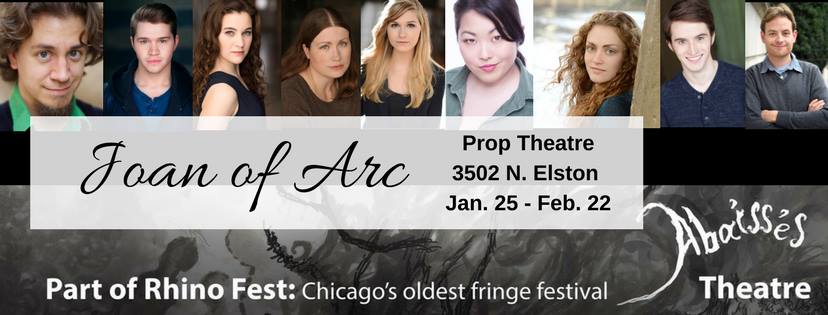 January – February: Joan of Arc. Abaisses Theatre debuts with a world premier of Alexandra Renieri’s Joan of Arc at RhinoFest. I’ll be performing as Bishop Pierre Cauchon, the enormously corrupt judge.
January – February: Joan of Arc. Abaisses Theatre debuts with a world premier of Alexandra Renieri’s Joan of Arc at RhinoFest. I’ll be performing as Bishop Pierre Cauchon, the enormously corrupt judge.

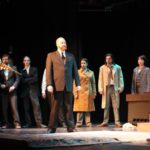
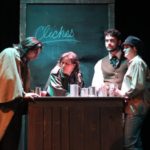
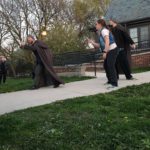

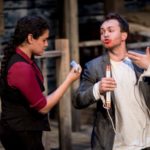
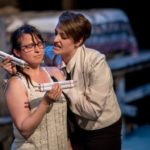



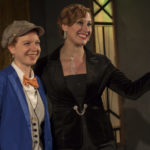

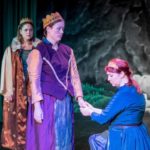

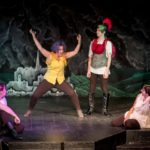

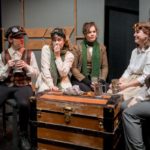
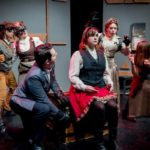
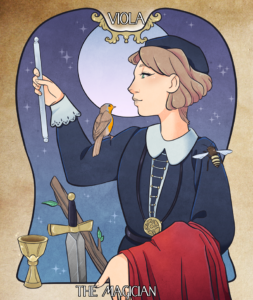
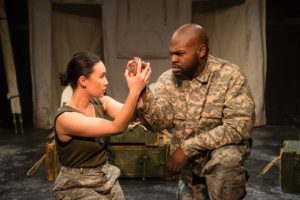






 Posting chapters from NaNoWriMo will hopefully introduce some accountability. Honestly, though, I still don’t anticipate much success. Guess I’ll see.
Posting chapters from NaNoWriMo will hopefully introduce some accountability. Honestly, though, I still don’t anticipate much success. Guess I’ll see.